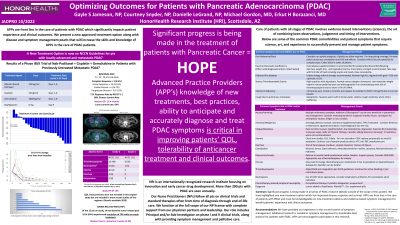Back


Clinical Posters
JL1025C: Optimizing Outcomes for Patients With Pancreatic Cancer
Saturday, October 22, 2022
10:00 AM – 11:00 AM ET

Has Audio

Gayle S. Jameson, MSN, ACNP-BC, AOCN® (she/her/hers)
NP/Associate Clinical Investigator
HonorHealth Research and Innovation Institute
Poster Presenter(s)
BACKGROUND
Patients with pancreatic ductal adenocarcinoma (PDA) experience many symptoms due to disease and/or chemotherapy including pain, fatigue, weight loss, nausea/vomiting (N/V), and change in bowel habits, and require frequent assessment and intervention. Knowledge of the best practices in the prevention and treatment of these symptoms by the advanced practice provider (APP), can minimize symptoms, improve patients’ quality of life (QOL), tolerability of anticancer therapy, and clinical outcomes.
INTERVENTIONS
In our oncology research center seeing over 200 PDA patients annually, we share management strategies for common symptoms based on published reports, national guidelines, and our clinical experience. In preventing and treating nausea and vomiting (N/V) related to disease and chemotherapy, the addition of olanzapine to antiemetic protocols has proven to be effective. For fatigue, evidence-based interventions including Wisconsin Ginseng and exercise have been beneficial. Frequent IV hydration, when not contraindicated, can decrease fatigue in patients who are chronically dehydrated. Symptoms of exocrine pancreatic insufficiency including early satiety, post prandial pain, diarrhea and weight loss are often undertreated. Many patients with these symptoms will note prompt marked improvement with the addition of the proper dose of pancrelipase. For anorexia, a referral to an oncology dietician is critical for tailored meal planning and nutritional support. Off-label use of low dose mirtazapine has been utilized as well. Given the high risk for thromboembolism in these patients, we do not recommend megestrol due to the added risk of clotting. Pain management can be complex requiring interdisciplinary collaboration and varying treatment modalities, such as opioids, nonpharmacologic interventions, intrathecal pain pumps, etc.
A new treatment regimen for patients with locally advanced and metastatic PDA including albumin bound paclitaxel, gemcitabine plus cisplatin that originated in our center, was added to the National Comprehensive Cancer Network guidelines in 2022. As reported in Jama Oncology, in 25 patients with advanced pancreatic cancer treated on this regimen, 71% experienced disease response including 2 complete responses, median time to progression was 10.1 months, and median survival was 16 months. We also noted in those patients with disease response, a prompt improvement in disease-related symptoms including pain. As more patients are now receiving this regimen, the APP needs to be aware of management strategies specific to this protocol including nausea prevention, adequate hydration, use of steroids, blood glucose management, and the timing and use of growth factors to support bone marrow function.
OUTCOME MEASURES
The goals of APP interventions in the care of patients with PC, when providing prompt recognition and management of symptoms, are to improve patients’ QOL and facilitate continuing dose intensity of treatment to maximize therapy response.
SUMMARY
APPs are front line in the care of patients with PDA. Current evidence-based practice in symptom management can significantly impact the patient experience and clinical outcomes.
RECOMMENDATIONS
Patients living with PDA typically experience numerous symptoms requiring complex interdisciplinary management. APPs caring for these patients must stay current with new treatment strategies and symptom management recommendations which will be further described.
Patients with pancreatic ductal adenocarcinoma (PDA) experience many symptoms due to disease and/or chemotherapy including pain, fatigue, weight loss, nausea/vomiting (N/V), and change in bowel habits, and require frequent assessment and intervention. Knowledge of the best practices in the prevention and treatment of these symptoms by the advanced practice provider (APP), can minimize symptoms, improve patients’ quality of life (QOL), tolerability of anticancer therapy, and clinical outcomes.
INTERVENTIONS
In our oncology research center seeing over 200 PDA patients annually, we share management strategies for common symptoms based on published reports, national guidelines, and our clinical experience. In preventing and treating nausea and vomiting (N/V) related to disease and chemotherapy, the addition of olanzapine to antiemetic protocols has proven to be effective. For fatigue, evidence-based interventions including Wisconsin Ginseng and exercise have been beneficial. Frequent IV hydration, when not contraindicated, can decrease fatigue in patients who are chronically dehydrated. Symptoms of exocrine pancreatic insufficiency including early satiety, post prandial pain, diarrhea and weight loss are often undertreated. Many patients with these symptoms will note prompt marked improvement with the addition of the proper dose of pancrelipase. For anorexia, a referral to an oncology dietician is critical for tailored meal planning and nutritional support. Off-label use of low dose mirtazapine has been utilized as well. Given the high risk for thromboembolism in these patients, we do not recommend megestrol due to the added risk of clotting. Pain management can be complex requiring interdisciplinary collaboration and varying treatment modalities, such as opioids, nonpharmacologic interventions, intrathecal pain pumps, etc.
A new treatment regimen for patients with locally advanced and metastatic PDA including albumin bound paclitaxel, gemcitabine plus cisplatin that originated in our center, was added to the National Comprehensive Cancer Network guidelines in 2022. As reported in Jama Oncology, in 25 patients with advanced pancreatic cancer treated on this regimen, 71% experienced disease response including 2 complete responses, median time to progression was 10.1 months, and median survival was 16 months. We also noted in those patients with disease response, a prompt improvement in disease-related symptoms including pain. As more patients are now receiving this regimen, the APP needs to be aware of management strategies specific to this protocol including nausea prevention, adequate hydration, use of steroids, blood glucose management, and the timing and use of growth factors to support bone marrow function.
OUTCOME MEASURES
The goals of APP interventions in the care of patients with PC, when providing prompt recognition and management of symptoms, are to improve patients’ QOL and facilitate continuing dose intensity of treatment to maximize therapy response.
SUMMARY
APPs are front line in the care of patients with PDA. Current evidence-based practice in symptom management can significantly impact the patient experience and clinical outcomes.
RECOMMENDATIONS
Patients living with PDA typically experience numerous symptoms requiring complex interdisciplinary management. APPs caring for these patients must stay current with new treatment strategies and symptom management recommendations which will be further described.

